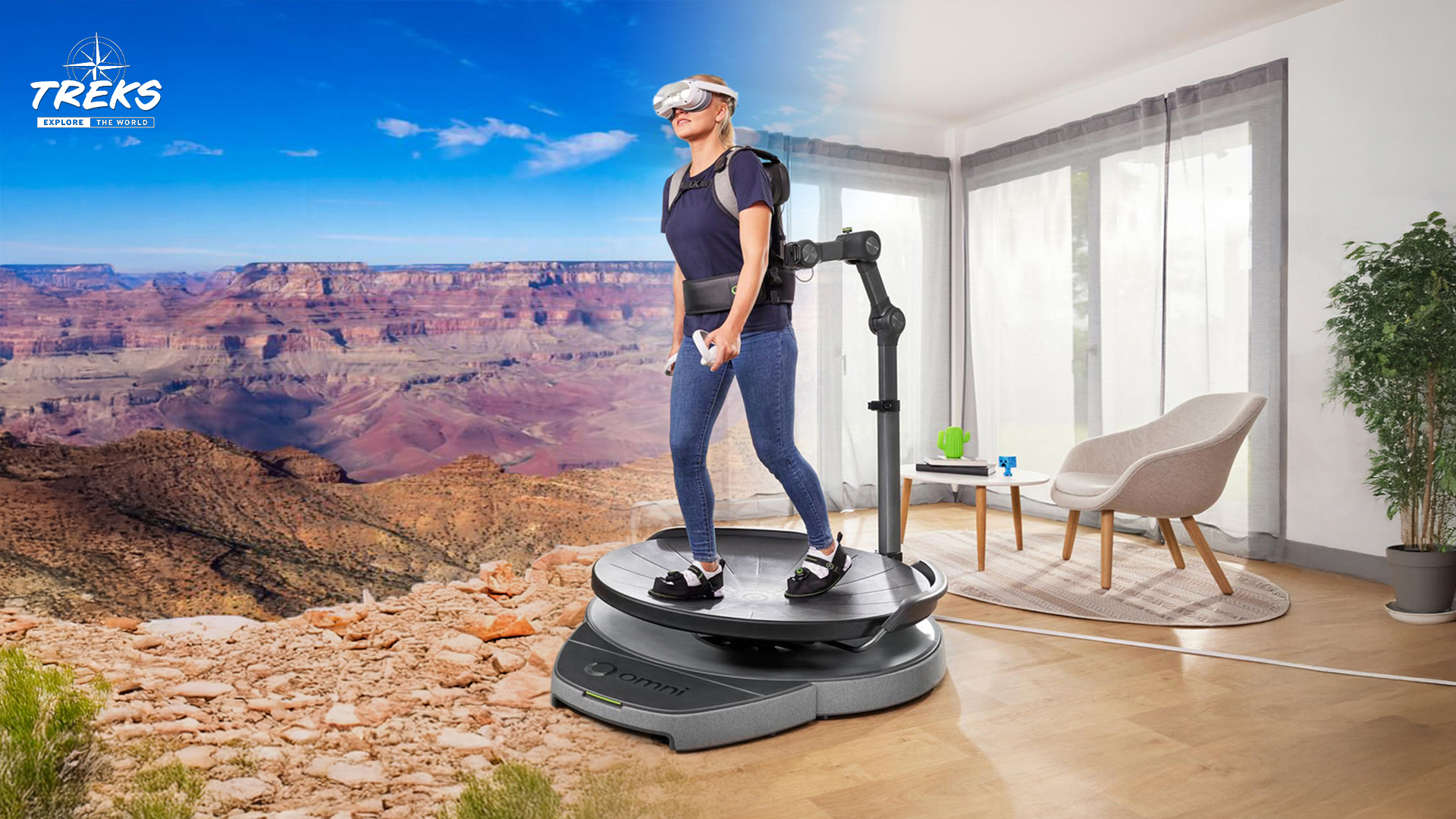
With Treks from Virtuix, you can experience the world’s most famous sights in VR — on foot on the Omni One VR treadmill.
The post VR treadmill Omni One gets its own travel app with world-famous sights appeared first on MIXED Reality News.


With Treks from Virtuix, you can experience the world’s most famous sights in VR — on foot on the Omni One VR treadmill.
The post VR treadmill Omni One gets its own travel app with world-famous sights appeared first on MIXED Reality News.
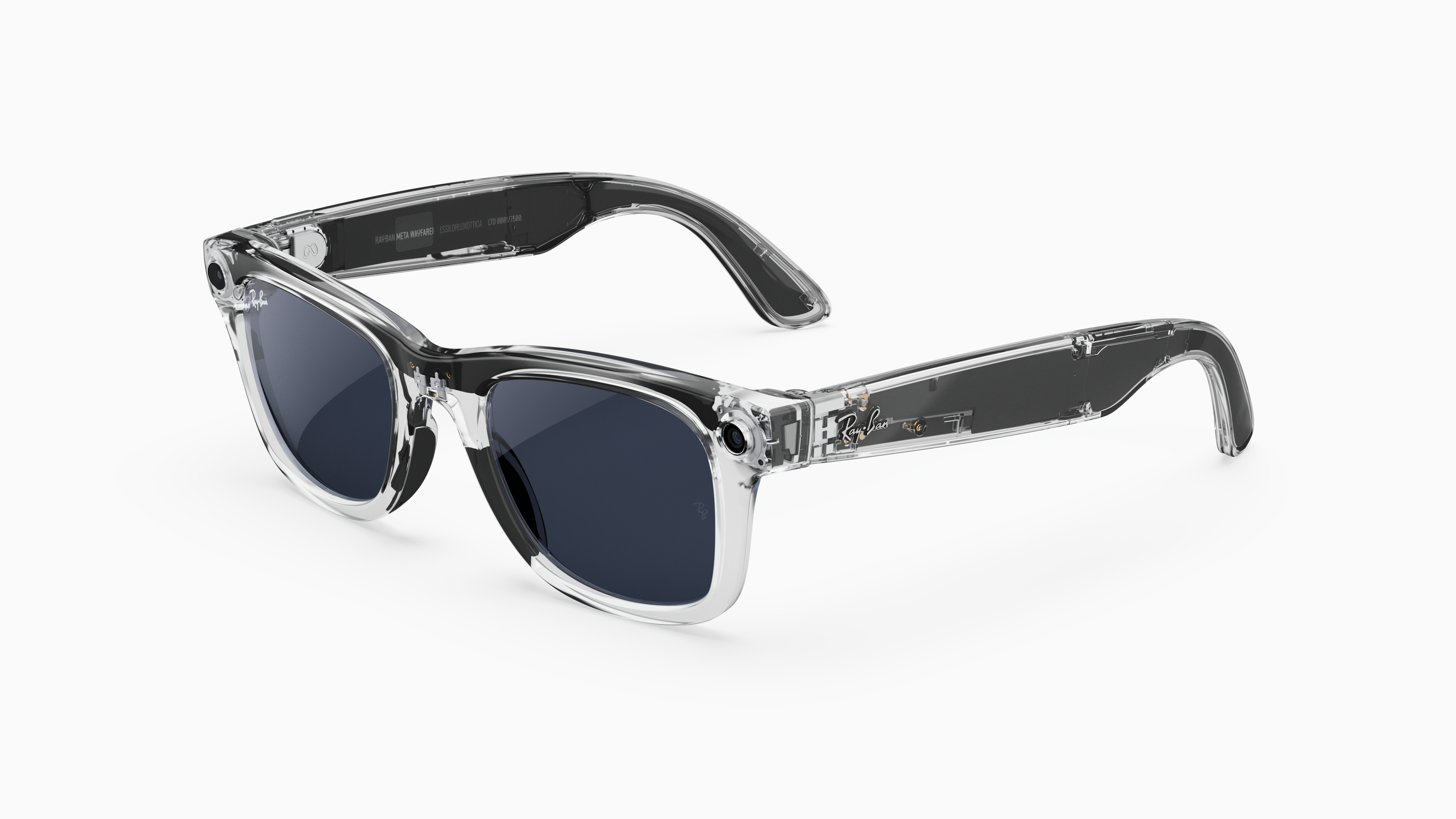
A new limited edition with a transparent frame for the smart glasses from Meta and Ray-Ban is in the starting blocks.
The post Ray-Ban Meta Smart Glasses: New limited edition coming this month appeared first on MIXED Reality News.
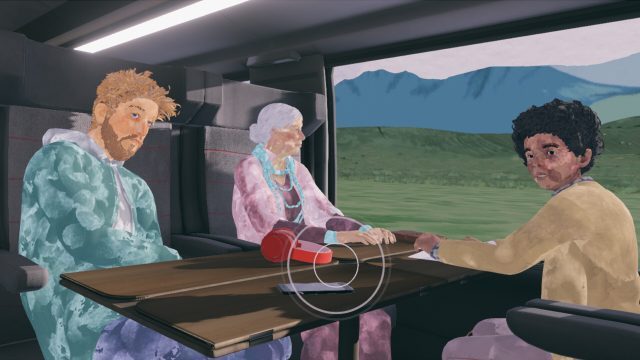

Astrea, the studio and publisher behind a host of VR narrative experiences, including Spheres, Astra, and Mobile Suit Gundam: Silver Phantom, has released an interactive VR experience on Quest and PC VR headsets that lets you embody passengers on a train, and help them face pivotal moments in their lives.
Called The Passengers, the four chapter, 40-minute interactive experience allows you to become one of four characters, experiencing their internal monologues and interacting with the environment with both your hands and voice.
Developed by Canada-based studio Couzin Films and France-based Les Produits Frais, The Passengers tells each story with a variety of styles, offering different visuals such as oil paint, watercolor, pencil, colored pencils, and immersive video.
“In this experience, you can be each one of the four passengers who all have their own personal quest. The course of each story is affected according to what they say, where they look, and what they do with their hands. You are one deciding all of that. The characters were created by volumetrically scanning the four actors. They were then rigged and animated through motion capture.”
While The Passengers is new to consumer headsets, it’s actually been on the international festival circuit since 2021 shortly after its completion.
The experience won the Best Immersive Experience – Fiction award at the Canadian Screen Awards (2022), and was selected as a finalist at the Prix Gémeaux (2022), Prix Numix (2021) and the VR Experience of the Year at the VR Awards (2021).
You can find The Passengers on the Horizon Store for Quest 2 and above, and Steam for PC VR headsets, priced at $5.
The post Lauded VR Storytelling Studio Astrea Releases Latest Project on Quest & PC VR appeared first on Road to VR.

Bad news for Vertigo 2 fans: The eagerly awaited story add-on Into the Aether will be released a month later than planned.
The post Vertigo 2: DLC for the popular VR shooter will no longer be released in March appeared first on MIXED Reality News.
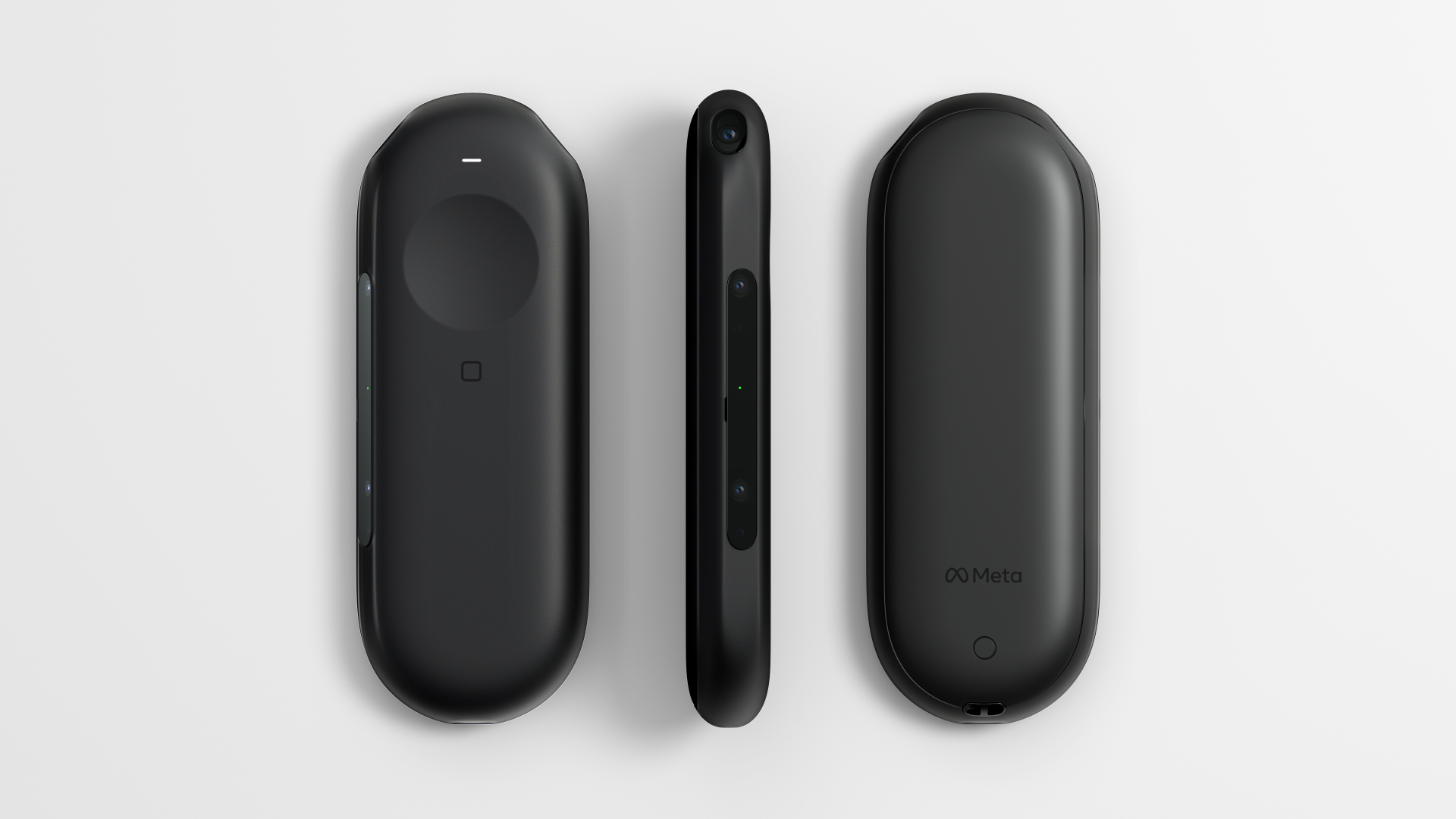
Meta provides insights into the development of the Orion AR glasses and presents the wireless pocket computer “Puck”.
The post Meta’s Orion AR glasses: “We start getting into the limits of physics” appeared first on MIXED Reality News.
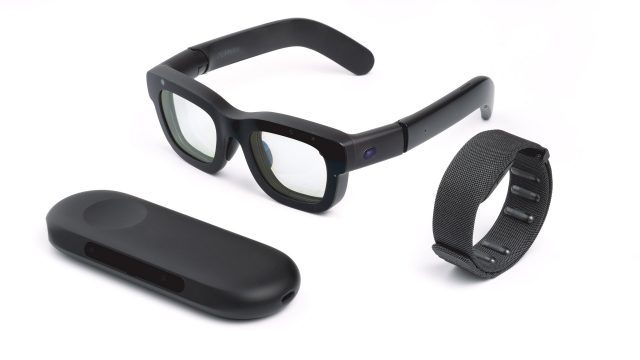
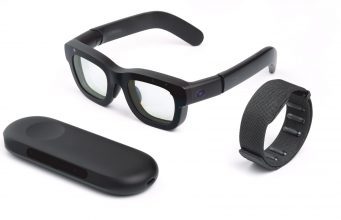
Meta revealed its Orion prototype last year to show the progress it has made toward compact AR glasses. Today the company talked more about the prototyping process, especially regarding the ‘compute puck’ that offloads much of the heavy processing into a device that goes in the user’s pocket.
One of the major reasons that today’s XR headsets are so big is because they need room for a lot of processing power, battery volume, and heat dissipation. But with Meta and the rest of the industry aiming to eventually make all-day wearable AR glasses, size becomes a serious challenge.
A ‘compute puck’ is a companion device for AR glasses that moves some of the processing and battery off of the user’s head and into a pocketable device.
Meta used the compute puck approach for its prototype Orion AR glasses. While companies like Magic Leap have used similar approaches in the past, Orion’s approach is somewhat novel because the compute puck is completely wireless. But it didn’t start out that way.
Today Meta revealed more about the prototyping process for Orion. In the post, the company says the compute puck was originally envisioned as a tethered, neck-worn device, codenamed Omega.
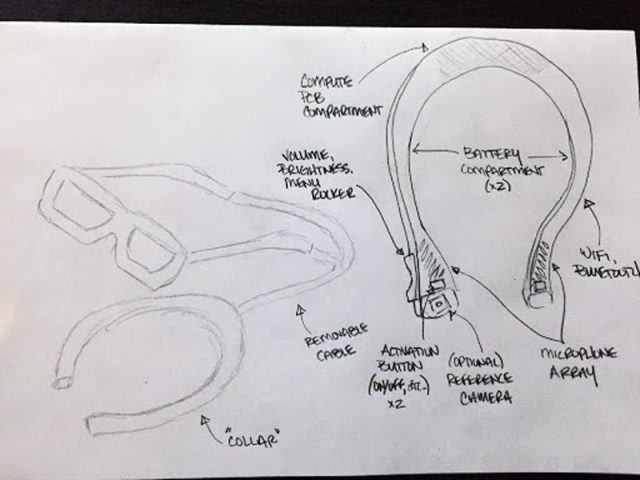 But this concept apparently didn’t last very long after the team decided it would cut the tether and make a pocketable puck that was completely wireless.
But this concept apparently didn’t last very long after the team decided it would cut the tether and make a pocketable puck that was completely wireless.
After becoming untethered, the Orion team realized that it opened new possibilities for what could be done with the device.
One clever idea involved using the puck as an anchor for content, such as projecting a video call above the puck. Not only would this serve as a tangible place for users to move their content from one place to another, it would also mean encouraging them to pull the puck out of their pocket, resulting in better performance thanks to improved cooling.

“It’s unlike anything you’ve ever seen—the device has the potential to create really fun and unique interactions,” said Emron Henry, Industrial Designer at Meta. “The user experience feels a bit like unleashing a genie from a bottle, where holograms seamlessly emerge from and dissolve back into the device.”
The team also considered using the puck as a controller, which could be tracked using inside-out tracking thanks to on-board cameras.
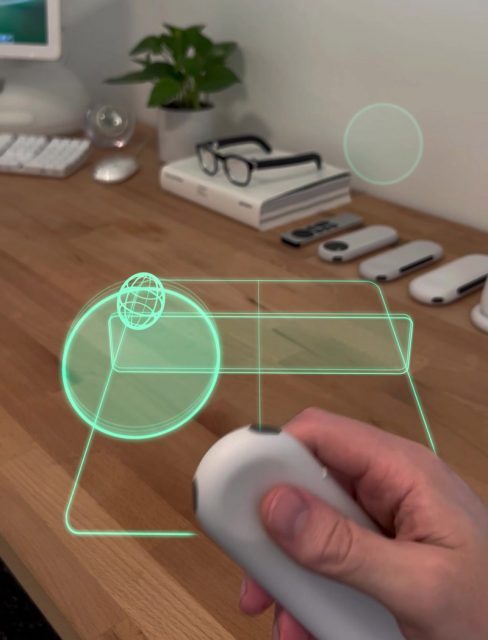
In the end, the version of Orion that has been seen publicly leans away from using the controller as a significant part of the input modality. Instead the glasses use a combination of eye-tracking and neural inputs thanks to the company’s prototype EMG wristband.
But there’s no telling what the final version of Orion will look like. For the team, this was a valuable time for design exploration.
“We’re defining a category that doesn’t quite exist yet,” notes Henry. “As you’d expect with R&D, there were starts and stops along the way. How will users expect to interact with holograms? Would they prefer to use an AR remote or is hand tracking, eye gaze, and EMG sufficient for input? What feels intuitive, low friction, familiar, and useful?
Although Meta says that Orion will eventually lead to its first pair of consumer AR glasses, for now the company has only a rough idea of when its first AR glasses will launch and what it will cost.
The post Early Versions of Meta’s Orion AR Glasses Envisioned a Neck-worn Compute Unit appeared first on Road to VR.
Face Jumping promises a surreal VR adventure where you swap perspectives with others via eye contact on Quest Pro.
Developed by Tender Claws, the studio behind Virtual Virtual Reality and Stranger Things VR, Face Jumping is a short 30-minute VR experience where you leap between the minds of other humans, animals, objects, and more. The game aims to explore the “desire and impossibility of seeing through the eyes of another,” alongside how “seeing and being seen shapes reality, perception, and self.”
A home release date is currently unconfirmed, though Face Jumping will premiere at this month’s SXSW XR Experience Exhibition. Directed by the Tender Claws co-founders, Danny Cannizzaro and Samantha Gorman, the experience aims to consider questions around perception, consciousness, and “the desire for and power of connection.”
You can find a brief description below to learn more.
Two strangers’ eyes catch in an elevator — what transformational powers does that moment hold? Face Jumping is an interactive VR short that uses eye-tracking technologies as both muse and platform to explore the impossible desire of seeing through another’s eyes. Visitors navigate a journey of rebirth and evolution by meeting the gaze of other characters and swapping perspectives – including those of birds, rocks, delivery bots, ghosts, cowboys, and clouds.
Given how integral eye tracking is to the premise, it’s unclear if we’ll see this available more widely on headsets like Apple Vision Pro and PlayStation VR2. Furthermore, it’s unclear if Tender Claws will adapt the gameplay for VR headsets without eye tracking support, such as Quest 3. As soon as we learn more, we’ll keep you updated.
Face Jumping will premiere at the SXSW XR Experience Exhibition between March 9-11. A home release date is currently unconfirmed.
Vertigo 2: Into the Aether has been delayed by a month.
Previously targeting a March 30, 2025 launch to coincide with the second anniversary of Vertigo 2, developer Zach Tsiakalis-Brown confirmed the delay to UploadVR, and the upcoming DLC now lists ‘April 2025’ on Steam. Beyond the wider April release window, a specific release date for Into the Aether is currently unconfirmed.
Revealed during the UploadVR Winter Showcase last December, Vertigo 2: Into the Aether is a DLC expansion for our 2023 VR Game of the Year, where Brian fights back against the Void Delegation. This gives you “The Void Grappler” grappling hook that’s attachable to most surfaces for free swinging, alongside “The Void Deflector” for deflecting attacks and accumulating energy for counterattacks.
If you’re interested in learning more, Tsiakalis-Brown carried out a Q&A back in January, following our wide-ranging interview back in December. Detailing his decision to remaster Vertigo, expectations for the future, time working at Valve, and more, you can watch that below in full.
Vertigo 2: Into the Aether arrives this April on SteamVR, and the base game is out now. While Vertigo 2 is also on PlayStation VR2, there’s currently no plans for this expansion to reach Sony’s headset.
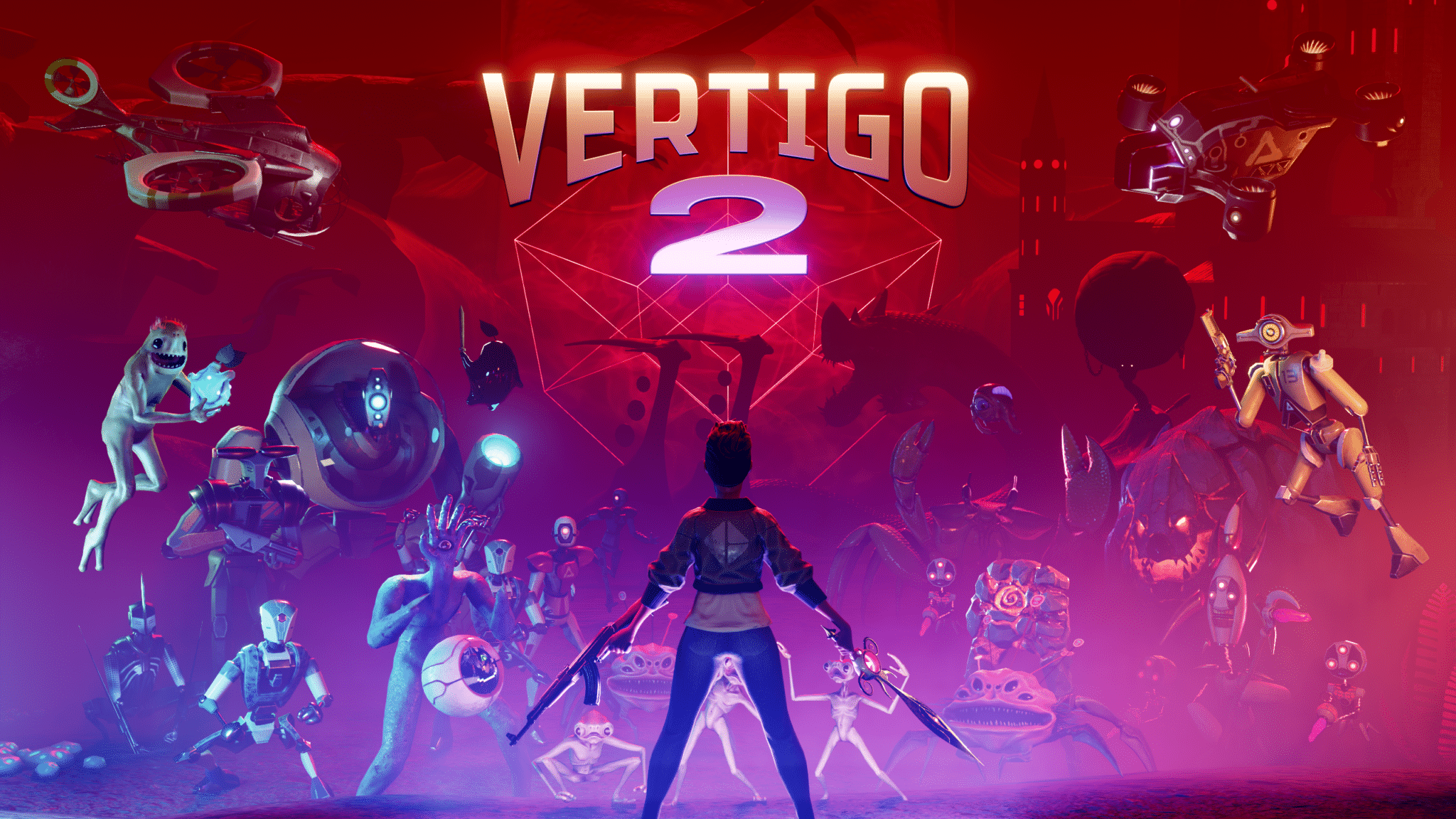
TREKS is a new VR tourism program for the Virtuix Omni One that’s out this week.
Available exclusively for the VR treadmill, Virtuix Studios describes TREKS as an immersive tourism experience designed to keep you active. The initial release on Omni One includes several locations ranging from the Grand Canyon, Niagara Falls from both the US and Canadian side, various landmarks across New York City, and Saudi Arabia with Fort Masmak.
For the unfamiliar, the Virtuix Omni One is an integrated home VR device that starts from $2595 with extra shipping costs. While Virtuix describes it as a treadmill, this isn’t completely accurate. Instead of a moving belt, you use special shoes that slide along a concave disc-shaped base. This also involves wearing a harness suit that keeps you stationary while moving your legs.
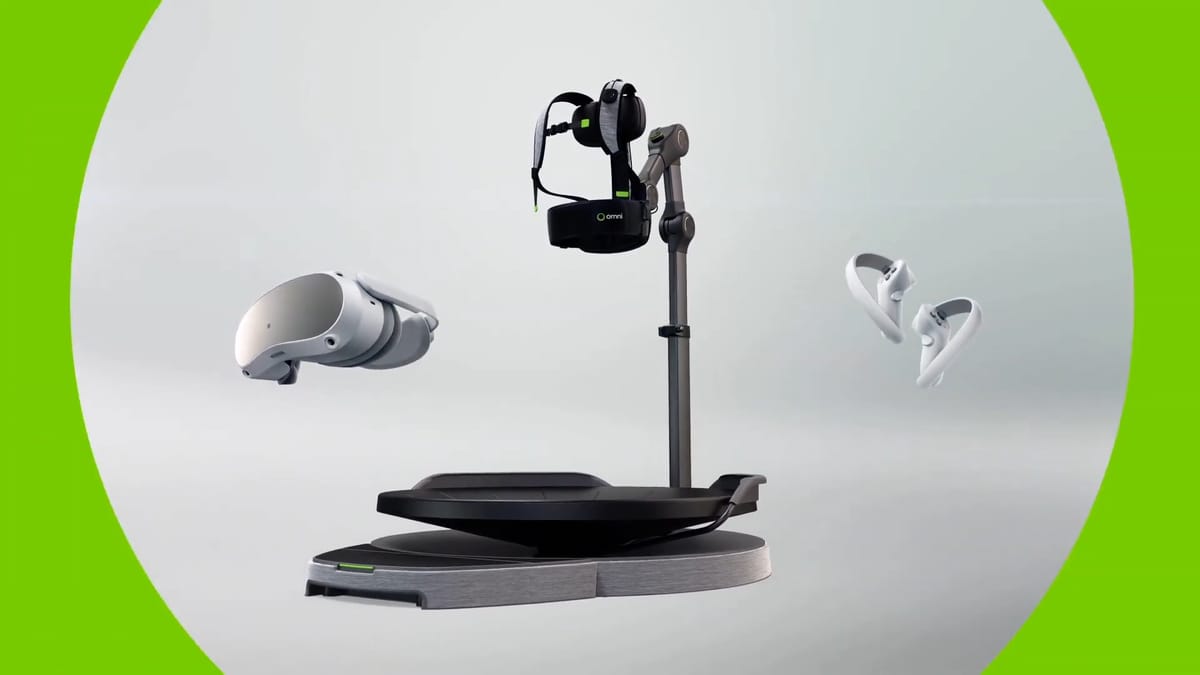
While the Omni One initially touted a lineup of 35 launch games following its launch in September 2024, that’s since expanded to over 55 games. February’s additions notably include Arizona Sunshine Remake, Arizona Sunshine 2, and Into The Radius, alongside Venture’s Gauntlet, Everslaught Invasion, Thief Simulator VR, and more.
TREKS will launch exclusively for Omni One for $30 on March 6, 2025. Additional DLC locations will also be announced “in the coming months,” promising new landmarks and historical sites.
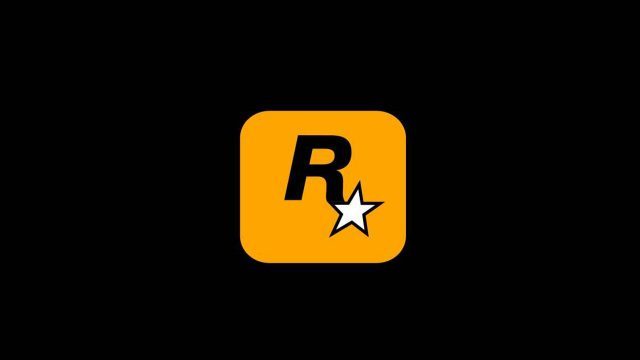
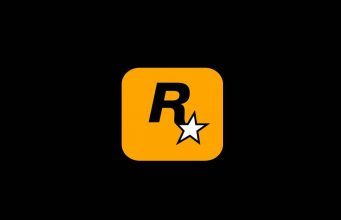
Rockstar Games announced it’s acquiring Video Games Deluxe, the Sydney-based studio behind L.A. Noire: The VR Case Files (2017) and the shelved Quest port of Grand Theft Auto: San Andreas (2004).
The details of the acquisition haven’t been made public, however Rockstar says in a press statement that Video Games Deluxe has now been renamed to ‘Rockstar Australia’, and will “continue [its] efforts to make the best games possible.”
In addition to those VR ports, Video Games Deluxe is best known for its work on hit detective game L.A. Noire (2011), as well as the Grand Theft Auto: The Trilogy (2021) compilation, which brought GTA III (2001), GTA: Vice City (2002) and GTA: San Andreas to mobile and modern consoles.

Shortly before the compilation’s re-release in late 2021 though, Rockstar and Meta (then Facebook) announced they were working to port GTA: San Andreas (2004) to Quest 2, which was slated to be led by Video Games Deluxe.
Rockstar never publicly announced Video Games Deluxe was involved, likely owing to the fact the port was cancelled shortly thereafter, however in a 2020 job listing the studio tipped its hand by announcing it was creating a “AAA open world title in VR” for Rockstar.
As a long-time support studio for Rockstar, the acquisition likely won’t change much for any potential revival of GTA: San Andreas for Quest. After years of silence, Meta confirmed with IGN in August 2024 the project was put “on hold indefinitely.”
The post Rockstar Games Acquires Studio Behind ‘L.A. Noire VR’ & Scrapped ‘GTA: San Andreas’ Quest Port appeared first on Road to VR.
All on Board offers a platform to play iconic board games in impeccably dressed virtual spaces – it just needs more time.
As someone with an embarrassing amount of dusty board game boxes sitting in storage, I found All on Board’s promise of a clutter-free and immersive digital alternative intriguing. Digital board game programs aren’t a new concept, even in VR, with Tabletop Simulator finding a home on headsets all the way back in 2016. Still, All on Board is pitching a fresh look at the genre, bolstered by thematic storybook settings players can immerse themselves in as they play licensed products with friends.
All on Board operates more like a well-dressed social platform than a game. Once you open the app, you’re dropped into a social hub to browse games and add other players to your session. The base game includes board game classics like Chess, Parchisi, Checkers and Go, which you can play cooperatively with friends or on your lonesome.
However, premium licensed games like Terraforming Mars and The Binding of Isaac need an additional purchase. This makes for a limiting first impression, though you at least get 25 minutes of playtime to test them before taking the financial leap. If one player owns the game, others can join and try it without the additional cost — another avenue of ‘try before you buy’ if you’re still curious after your initial test run.
My PC uses an NVIDIA GeForce RTX 3080, and my CPU is an AMD Ryzen 9 3950X. I used a Quest 3 via Virtual Desktop when playing on Steam, playing nearly equally between PC VR and standalone Quest 3 during this review.
Once you pick a game and start playing, you and your friends will appear as somewhat customizable cartoon avatars sitting across the table from one another. Modification currently amounts to a series of preset heads and upper bodies, and the developers note that full-blown customization will arrive at a later date. The cartoon avatars don’t feature mouth movement, which can be a bit strange given the intimate proximity. However, I did find once my co-op partner began chatting and moving their arms and head around, the initially uncanny first impression wore off quickly. After all, the game is always the focus.
Inviting others to your session is as easy as sharing your session code. It’s a small touch, but I’m pleased that the session code is consistently clear and visible whether I was in the central hub or the middle of a game. Adding to the positives, All on Board also allows for cross-platform gaming, meaning players with Quest headsets can sit at the table with PC VR users and vice versa. There is also an option to join as a spectator and hang out with your friends without investing in the inevitable betrayal and drama that comes with board games.
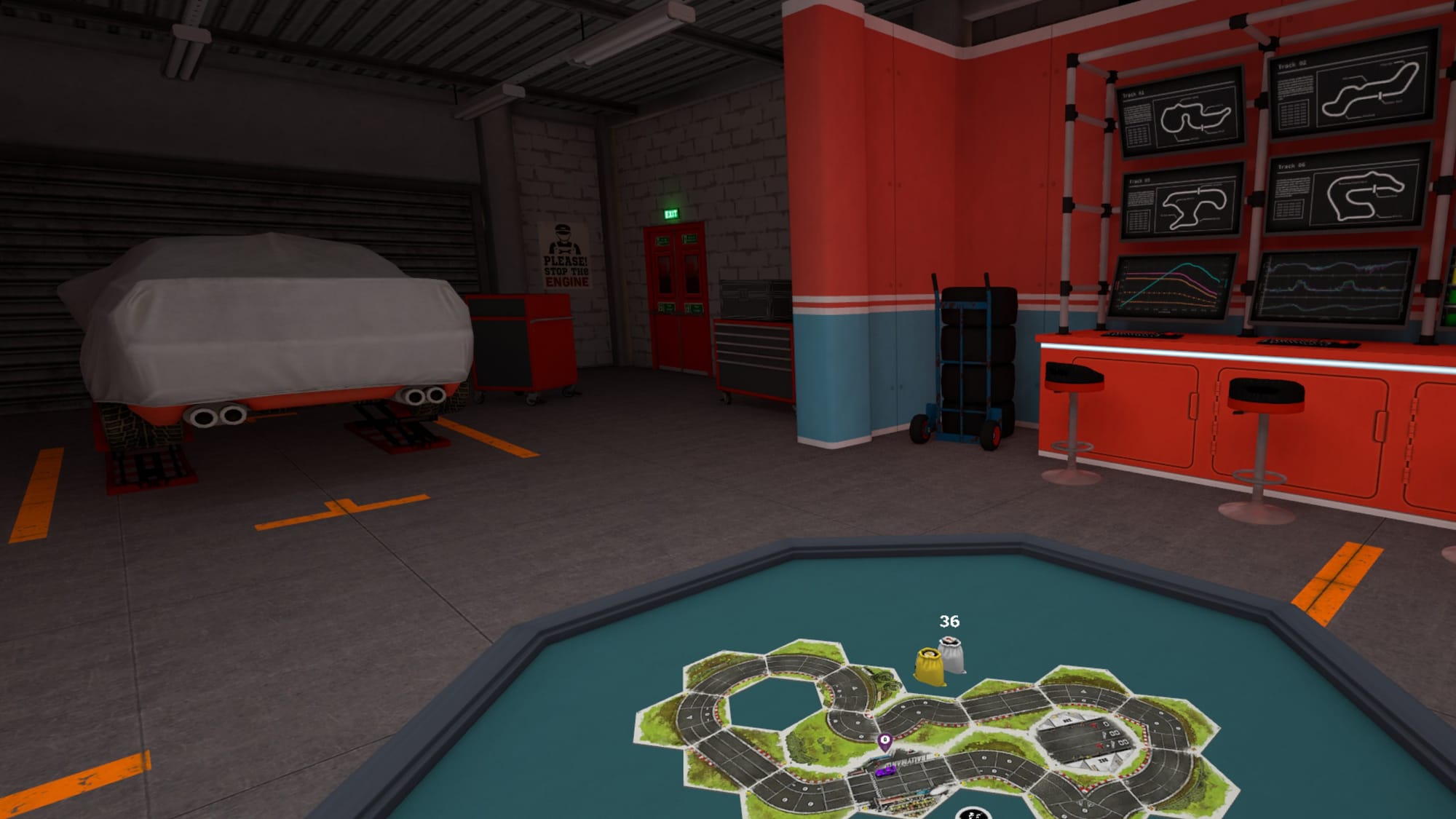
All on Board’s multiplayer wasn’t an entirely seamless experience, though, and when playing checkers with a friend, we noticed a few issues where the on board information wasn’t aligning between the two of us. This isn’t a big deal in a simple game where it’s clear who is winning; however, this may cause more complex problems with more complicated offerings like the competitive Bazaar-hopping game Istanbul. Thankfully, if you run into any issues and need to reset, a frequent autosave keeps track of your progress. You can also reload anytime while playing — if only real-life board games had quick save and quick load…
Where All on Board shines is in its thematically dressed and carefully decorated game rooms. Terraforming Mars drops you into a futuristic space dome surrounded by red dirt planes with various stock-tracking tickers plastered overhead. Escape The Dark Castle, on the other hand, pops you into a spooky cel-shaded dungeon with flickering flames that create an unnerving atmosphere. My personal favorite piece of environmental lore came in Rallyman: GT, where tyre-screeching occasionally entered the background mix. Each space feels like a meaningful extension of the base game, and I’m thoroughly enjoying inspecting the details between the fantasy worlds.
A key aspect in the enjoyment of board games is the tactile experience of snatching up cards and rolling dice, something The Game Kitchen has considered carefully when designing interactions for All on Board. Dice have a pleasant bounce when you throw them, and picking up cards is met with a comforting papery sound. However, on a few occasions, I found the tracking could get a little muddled at times, especially when playing on busier boards, complicating the process of pinching an individual die.
An important warning to consider is the lack of guidance when engaging with All on Board’s suite of tabletop simulacrums. For example, say you purchase or try out The Binding of Isaac. Instead of having the game explain any rules, it drops you into its impeccably dressed world, free to pick your seat and play. You can lift your digital wristwatch and prompt a “how to play” video explaining the rules.
The problem is that you still need a level of rules awareness to get a game going, and pressing set face buttons when highlighting an item only explains the object in question. I appreciate that All on Board tries to emulate a realistic board game experience, warts and all. Sadly, this feels like a missed opportunity for a digital platform to go the extra mile and include tutorial prompts for those less adept with the source material.
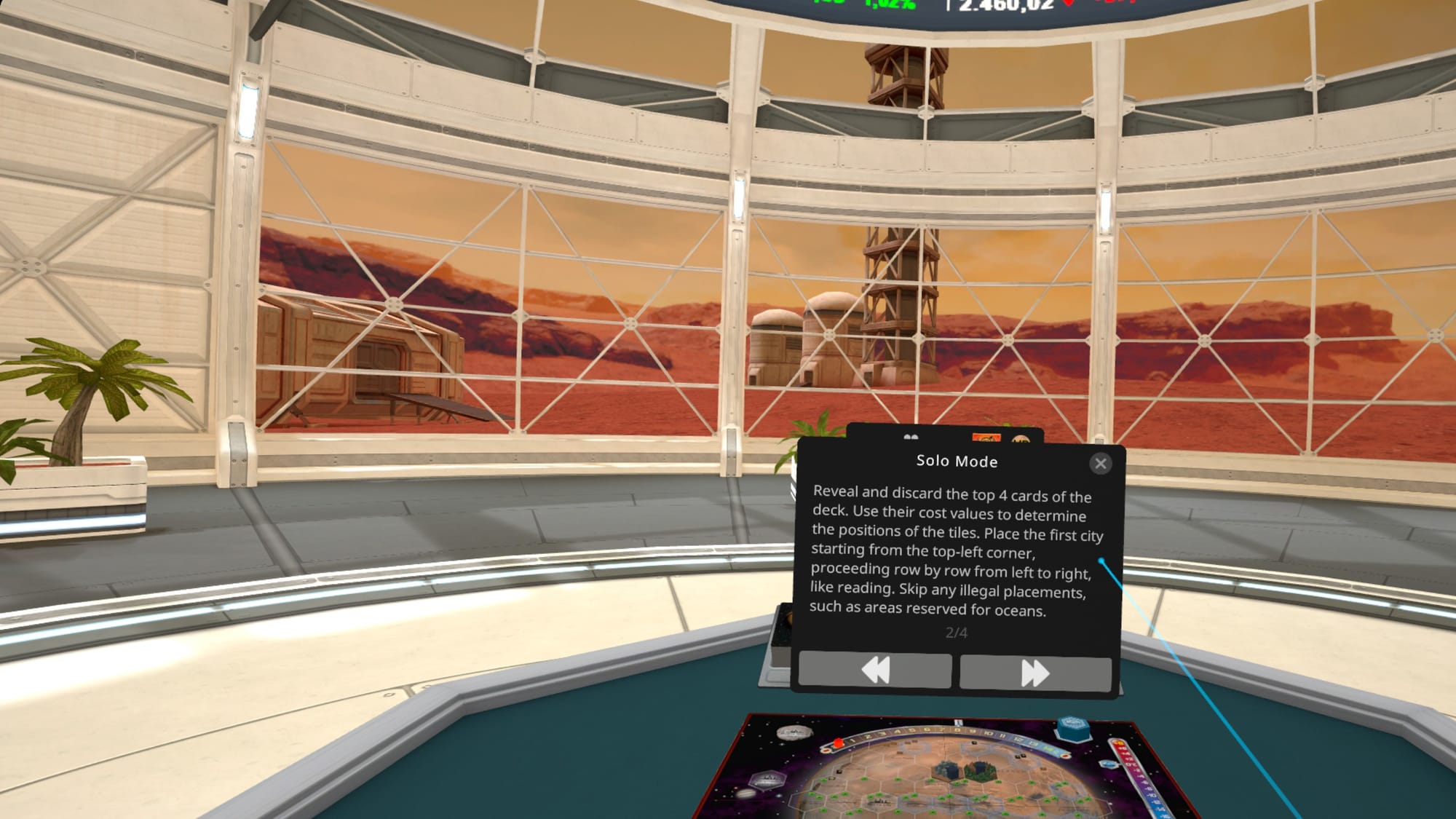
Elsewhere, a few technical issues only compounded the need for an intrusive helping hand. In one instance, my friend dropped out due to a network issue and needed to load back into the game. When they did, they didn’t automatically assume their established position at the table and ended up a spectator for the match, unable to interact with the pieces. An opportunity for me to mischievously mess up their game soon appeared, and it took a considerable amount of trial and error to realize we could reload a previous save. That allowed them to retake their victorious position – much to my chagrin. All on Board doesn’t always account for those new to the platform, which is a shame.
You can play board games in All on Board sitting or standing, and you adjust your position by holding an individual trigger and dragging it up or down as if climbing. Alternatively, you can reset your position in the play space on your headset. Where movement is concerned, you’ll have a few options. To rotate, you can press both grip buttons or use the joysticks to snap rotate. Movement around the space is limited to fluid locomotion via grabbing and pulling.
Getting into position around the board in-game is done automatically, with the player selecting their spot before the game begins, so there isn’t much moving throughout the space required to play. You can adjust the visual vignette from the settings using a slider to change its intensity. Additionally, you can set the degree of snap rotation at any time from the settings.
One perhaps unintended benefit of All on Board’s hands-off approach is that it opens the door for differing interpretations of board game rulesets. In one match of Checkers, I pretended I was winning by crawling my way into their seat while they simulated eating my pieces and tried to distract me by pointing into the distance. The game descended into chaos as I began throwing their checkers into the bag, earning points for lousy sportsmanship and revelling in my terrible glory. In this way, the lack of oversight will be rewarding to those who want to goof off while catching up with their mates — an underrated but important facet of a typical tabletop experience.
All On Board doesn’t feel like a complete experience right now — more of a work in progress. It’s a solid tabletop simulator with standout atmospheric set dressing, but there’s still a lot missing here that is not backfilled by the jovial banter between friends it can capably summon.
Features evident on Kickstarter but absent at launch like expanded character customization and custom games feel as though they would really benefit the experience and turn it into a definitive one-stop-shop for VR tabletop. We’ll have to wait and see if it eventually achieves that goal, and I’m keen to return when these updates arrive.
UploadVR uses a 5-Star rating system for our game reviews – you can read a breakdown of each star rating in our review guidelines. As a review-in-progress, this is currently unscored, and we’ll revisit this review following further updates.
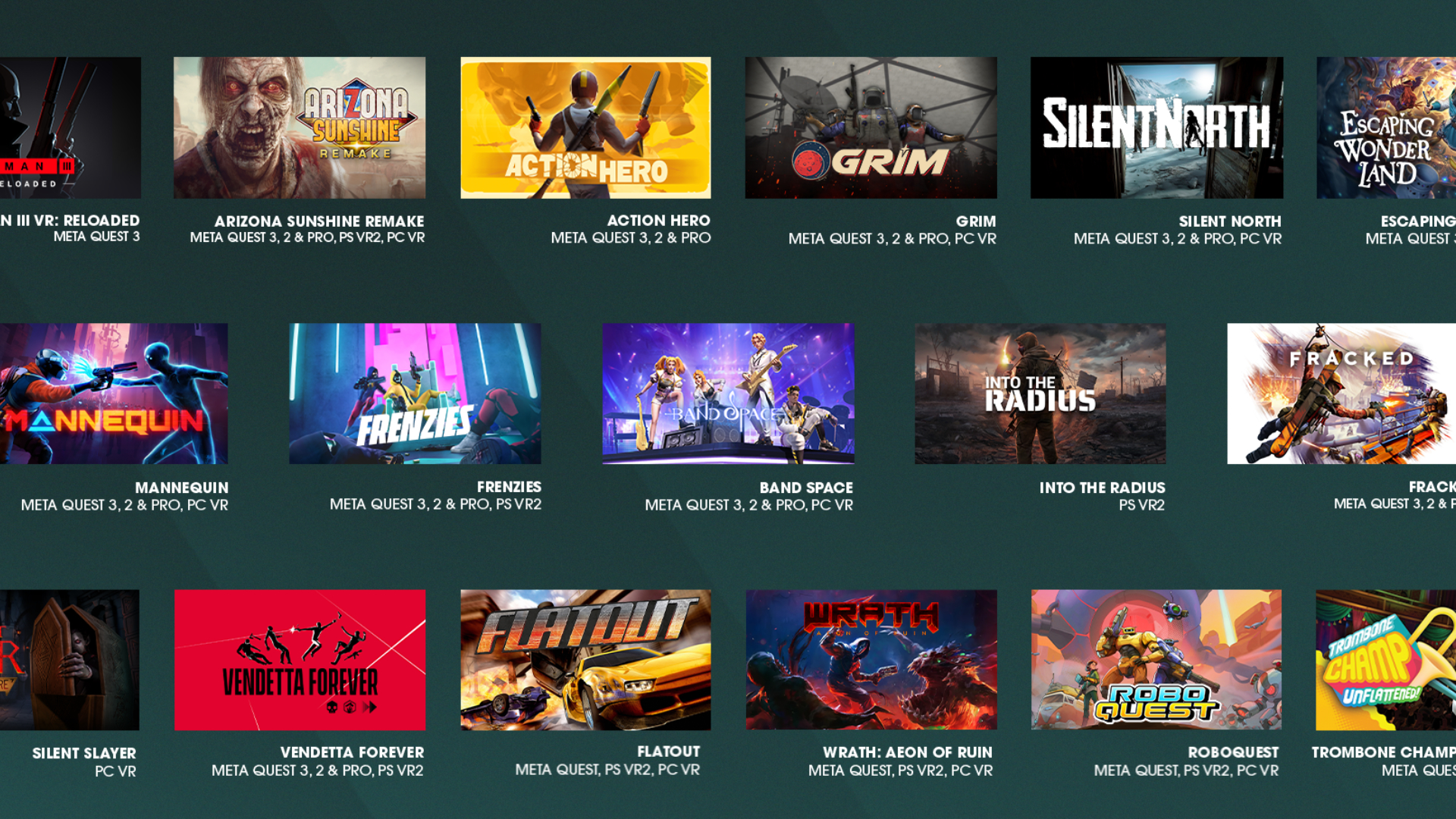
“Support is stronger than ever”: VR Games Showcase promises big announcements and surprises for all VR platforms.
The post VR Games Showcase 2025 announces further highlights appeared first on MIXED Reality News.
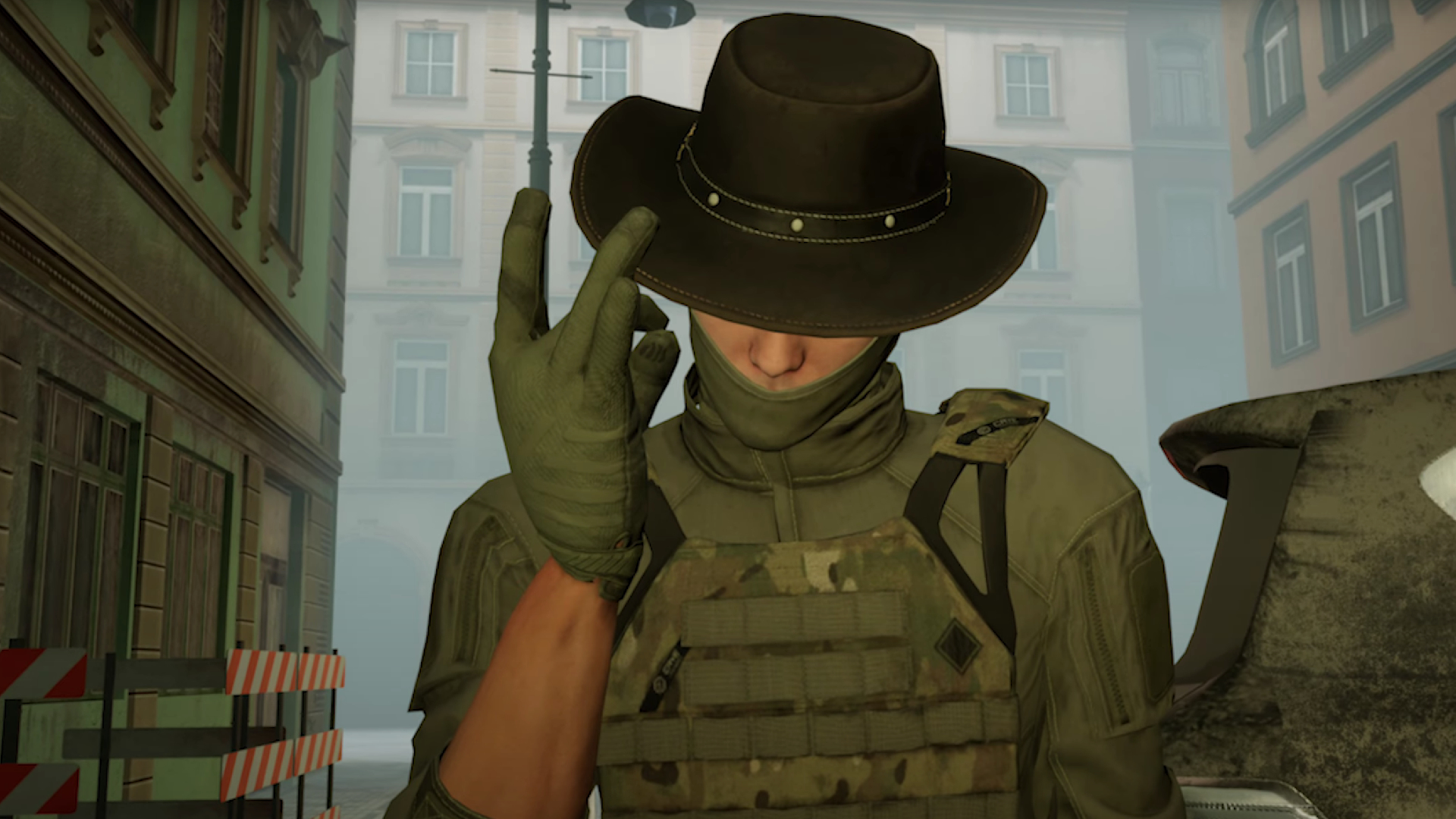
The monthly games catalog of Meta’s VR subscription Quest+ has been expanded once again. It includes two absolute VR classics and a popular tactical shooter.
The post More new additions for Quest+: Meta adds the most successful VR tactical shooter to the subscription appeared first on MIXED Reality News.
16% of Rec Room’s staff face layoffs, and the studio outlined how it plans to become more self-sufficient.
Initially launched in 2016, Rec Room is a social platform widely available across most VR headsets and flatscreen devices. Publicly sharing a message sent to the wider team, a new blog post from CEO Nick Fajt revealed the team size will be reduced by 16%. “This is no reflection on them or their work,” states Fajt, calling this decision one he had to make “for the long-term success of Rec Room.”
Addressing why he’s taken these steps, Fajt states the market has “changed dramatically” compared to the start of this decade. He points to slower gaming market growth, higher interest rates and “a more challenging fundraising environment” as causing financial difficulties, stating Rec Room needs to become self-sufficient.
The blog states affected employees will each receive three months of paid severance and six months of healthcare premiums. Wider career help with finding new employment, such as 1:1 assistance for resume writing and career coaching, was also mentioned.
Calling the layoffs a “last resort,” Fajt advised the team took preventive measures like reducing third-party and infrastructure spending, and re-training individuals for new disciplines. He also points to last year’s Nintendo Switch port, which arrived several months after its Destiny 2 crossover. Although Fajt states these measures improved finances, “they weren’t enough on their own.”
Moving forward, the blog outlined various key changes Rec Room’s looking to make. The studio will move to a flatter organizational structure with fewer managers, stating this allows for faster decision-making. Internal teams will be smaller, cross-functional and operate with more autonomy, and the blog also details the need to be “scrappier and more efficient.”
As for the game itself, Rec Room aims to “dramatically expand who can create” with two currently unnamed changes. Rooms 2.0 is also mentioned as “the largest bet we’ve made as a company” that allows for bigger and more complex rooms. Finally, Fajt explains that the studio is looking to “put more value” into the Rec Room Plus subscription, though in what form is currently unknown.
The next VR Games Showcase airs this March, featuring new reveals from Flat2VR Studios and Hitman: World of Assassination.
Following its debut last year, the VR Games Showcase is back with “major reveals and updates on anticipated games.” Initially announced last month, it’s now been confirmed that the upcoming spring 2025 edition will be headlined by Hitman: World of Assassination on PlayStation VR2, while Flat2VR Studios will provide updates on Roboquest VR, Wrath: Aeon of Ruin, and more.
The following week saw the showcase reveal the inclusion of Ghost Town, Prison Boss Prohibition, Deep Cuts, and Exoshock, alongside “a big surprise” from Triangle Factory (Breachers). Over 15 developers and “just over 20 titles” will feature in this presentation, with today’s announcement adding Memoreum and Slender: The Arrival VR to the list.
Further news on “existing multiplayer games and experiences with new updates” is also expected, and Flat2VR Studios previously teased a March reveal for its next game in our recent interview.
Co-founded by two former UploadVR staff members, Jamie Feltham and Zeena Al-Obaidi, the upcoming event follows the inaugural VR Games Showcase back in August. Notable reveals included debut gameplay footage for Hitman 3 VR Reloaded, the Arizona Sunshine Remake announcement, Fracked coming to Quest, four games from Flat2VR Studios, and more.
The VR Games Showcase airs on YouTube and TikTok Live on March 11 at 9am PT.
This article was initially published on February 18, 2025. It was updated on March 4, 2025, when new studios were confirmed to be joining the upcoming showcase.
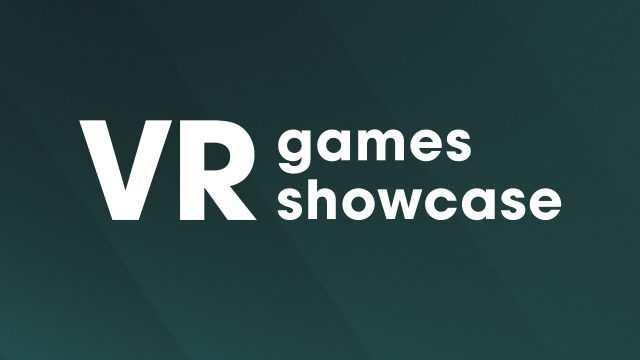

VR Games Showcase is returning next week, promising to feature 20+ VR games from over a dozen developers and publishers. The livestream, kicking off on March 11th at 12 PM ET, is slated to not only include updates to upcoming releases, but also new game announcements as well as exclusive peeks at gameplay.
Event organizers have already teased a few of the 15+ publishers taking part in the VR Games Showcase next week, which thus far is set to include Flat2VR Studios, Triangle Factory, Fireproof Games, tinyBuild, Trebuchet, IO Interactive, PolarityOne, Patient 8 Games, Blue Isle Studios and Perp Games.
Here’s a breakdown of what’s been confirmed so far:
We’ll of course be following along, but you can catch this year’s VR Games Showcase livestream on March 11th at 9 AM PT / 12 PM ET (local time here) across YouTube and TikTok Live.
The post VR Games Showcase to Feature 20+ Games Next Week, Including ‘Hitman’, Flat2VR Ports & More appeared first on Road to VR.
Meta’s CTO has responded to the negative discourse around his leaked “2025: The Year of Greatness” memo.
In the viral memo from November which leaked last month, Andrew Bosworth told the staff of Meta Reality Labs, the company’s hardware and metaverse division, that 2025 will determine whether it’s “the work of visionaries or a legendary misadventure”.
But one line in the memo sparked particular concern from the XR community, wherein Bosworth declared that “Horizon Worlds on mobile absolutely has to break out for our long term plans to have a chance”. For some, this was interpreted as a sign that Meta might ditch its Quest headset efforts if Horizon Worlds on smartphones isn’t a major success.
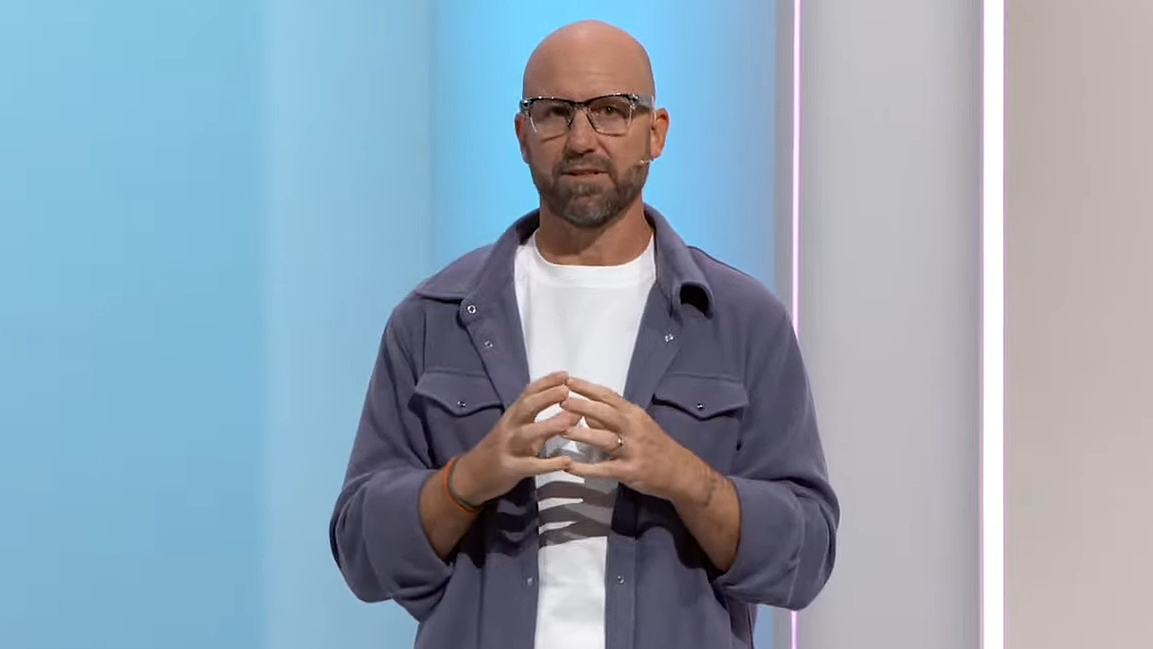
Now, a month after the memo leaked, Andrew Bosworth has responded to these concerns in an answer to a question during his latest Instagram “ask-me-anything” session.
“Social connection has always been the core of what we do, and owning the social substrate of whatever the next platform is, that’s always going to be important,” Bosworth explains.
“So I think we probably never give up. Never, never, never give up!”
Bosworth’s full response.
“One of the problems with reading these kinds of internal documents is that you don’t always get the full context,” he continues. “The context around it collapses.”
Internal all-hands memos are often rallying cries to staff, akin to a general riling up an army before a battle, rather than literal expressions of a company’s exact position, and Bosworth seems to be suggesting that his memo is no different.
“For us, the real context of that memo is that this is an exciting year. It really feels like a lot of things are breaking our way.”
“Is this a make-or-break year? Well, sometimes they all are.”
Job Simulator, Ghosts of Tabor, and Eleven Table Tennis have all been added to the Meta Quest+ games catalog.
For the unfamiliar, the Meta Quest+ subscription offers two pre-selected games each month alongside a rotating selection of titles in its Games Catalog. After confirming sports hit GOLF+ and VR roguelike The Light Brigade as the latest Quest+ monthly games, Meta’s now introduced three new titles to the catalog alongside this.
Initially spotted on X (via @Martin76x), this includes two of VR’s more established older hits that first released in 2016. Job Simulator by Owlchemy Labs needs little introduction for most, and it’s joined by Eleven Table Tennis from For Fun Labs. Then we have Combat Waffle Studios’ more recent extraction-based shooter, Ghosts of Tabor, which reached $20 million in revenue last September.
Elsewhere with the Quest+ games catalog, there are a few differences between the February and March lineups. We’re not sure exactly when they were removed, but 2MD: VR Football Unleashed ALL☆STAR, Fruit Ninja, Jurassic World Aftermath Collection and Until You Fall have left. However, other new games include Angry Birds VR, Broken Edge, Espire 2, and Mini Motor Racing X.
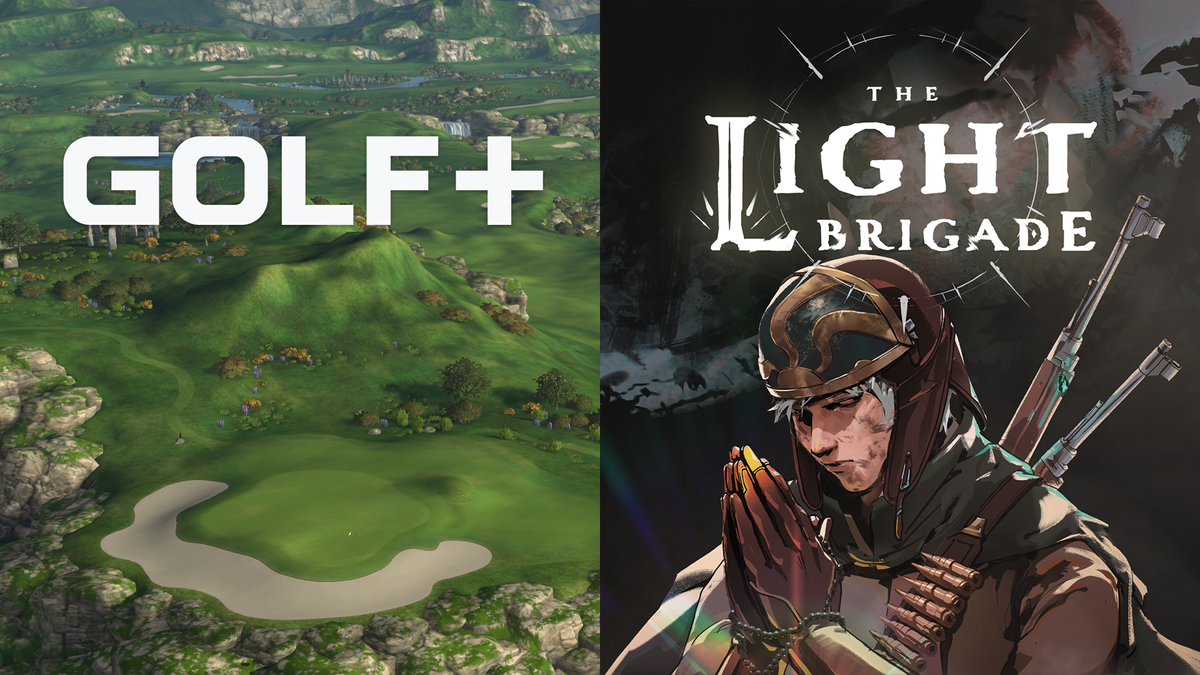
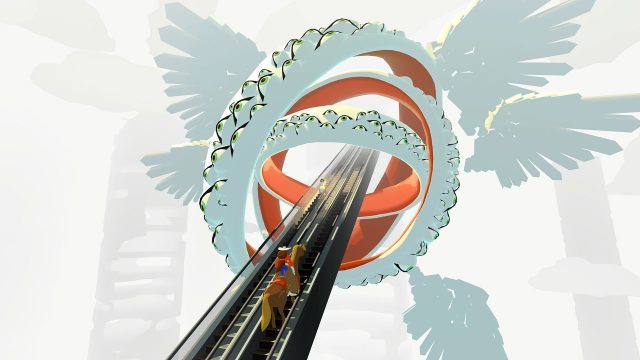
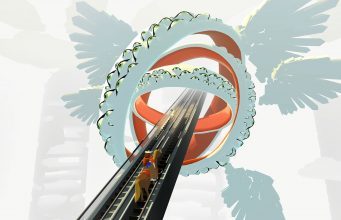
Tender Claws, the studio behind Stranger Things VR (2024) and Virtual Virtual Reality (2017), announced they’re debuting another patently weird VR experience at SXSW this week, which is all about swapping perspectives by making eye contact.
The VR experience, called Face Jumping, certainly sounds like another one of Tender Claws’ wildly inventive experiments into virtual reality, as it’s debuting alongside a host of others in the XR Experience Exhibition at SXSW’s Fairmont location next week.
The 30-minute experience is slated to serve up eye-tracked interactions that lets the player change perspectives by making eye contact with characters, animals, and objects. The studio says Face Jumping invites players to “reflect on the act of seeing and being seen, evoking questions about perception, consciousness, and how we connect to others through a glance.”
While most recently known for developing Stranger Things VR, the LA-based studio was also behind the mind-bending theatrical experience The Under Presents (2019), which included live performers interacting with at-home users.
It calls Face Jumping “a return to Tender Claws’ roots in experimental storytelling, multi-layered narratives, and absurdist explorations of technology and human connection.”
Tender Claws hasn’t revealed whether it’s releasing Face Jumping beyond the experience’s debut at SXSW, which will be open to badge holders on March 9th – 11th in Austin, Texas.
Since it primarily makes use of eye-tracking, it could hypothetically come to any number of platforms, including Apple Vision Pro, Meta Quest Pro, and PSVR 2. We’ve reached out to the studio to clarify this, and will update this piece when/if we know more.
The post ‘Stranger Things VR’ Studio’s Next Project ‘Face Jumping’ Looks Like Another Patently Weird VR Experience appeared first on Road to VR.

Rockstar Games has acquired the Australian studio Video Games Deluxe, which previously worked on GTA San Andreas VR.
The post Rockstar acquires GTA San Andreas VR developer – but don’t get your hopes up appeared first on MIXED Reality News.